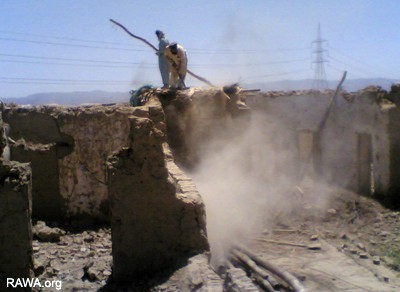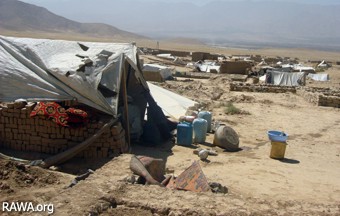IRIN, June 2, 2008
AFGHANISTAN: Jalozai camp closed, returnees face difficulties at home
"Some families have not been able to return to their places of origin because of tribal conflicts, landlessness, or insecurity," UNHCR said in a statement on 2 June.
The once largest Afghan refugee camp in Pakistan's North West Frontier Province (NWFP), Jalozai, has been closed down and most of its residents have returned to Afghanistan, the UN Refugee Agency (UNHCR) said.

RAWA: Afghan refugees were forced to destroy their houses in Khewa Camp and leave for unknown destiny in Afghanistan.
More than 120,000 Afghan refugees have been repatriated from Pakistan, almost half from Jalozai, since March 2008, with UNHCR assistance.
"About 53,000 of all returnees were living in the Jalozai camp," Nadir Farhad, a UNHCR spokesman in Kabul, told IRIN.
Tens of thousands of Afghan refugees have settled in the Jalozai camp since the 1980s when Afghanistan was engulfed in war after the Soviet invasion in 1979 and subsequent fractional fighting among various militia groups in the 1990s.
The camp has been shut according to an agreement reached between the governments of Afghanistan and Pakistan and the UNHCR in 2006; however, implementation has been delayed for humanitarian reasons.
"Refugees have returned voluntarily," Farhad said. "They had the option to either return to Afghanistan or move to other areas inside Pakistan."
"Refugees were given the option to relocate inside Pakistan or repatriate. The majority of them chose to repatriate because they either found relocation unattractive or they didn't have the means to sustain themselves outside the camp," he added.
In March 2008, UNHCR had estimated the number of refugees living in Jalozai at between 80,000 and 100,000 individuals. With about 54,000 now registered as returnees, the remaining thousands apparently have moved to other locations inside the host country, UNHCR said.
Returnees become IDPs
The majority of the repatriated families from Pakistan have moved to eastern Afghanistan - particularly to Nangarhar, Laghman and Kunar provinces, according to UNHCR.
While most returnees have moved to their places of origin across the country, 2,650 families – about 14,000 individuals – have set up temporary settlements in five locations in Nangarhar and one in Laghman provinces.

RAWA: A newly established refugee camp 60 km away from Kabul city where hundreds of families live in hell like conditions. These are Afghans expelled from Pakistan and Iran 6 months ago and still have no access to clean water and live on only bread. As the winter approaches, fear of a human catastrophe comes in at the door of every one of these poor residents.
"Some families have not been able to return to their places of origin because of tribal conflicts, landlessness, or insecurity," UNHCR said in a statement on 2 June.
The repatriated refugees who have become internal displaced persons (IDPs) in Nangarhar and Laghman provinces have been suffering various difficulties, UNHCR and government officials conceded.
"Almost all of them suffer lack of access to basic needs such as food, water, healthcare and shelter," Abdul Qader Zazai, adviser to the Ministry of Refugee and Returnee Affairs (MRRA), told IRIN in Kabul.
Backed by UNHCR, the provincial department of rural rehabilitation and development has facilitated water delivery by tankers and has also started projects to dig wells where possible, a local official said.
Mobile health clinics have also been facilitated but only for some returnees/IDPs, Zazai said.
Although water delivery and mobile health services have only temporarily met the most immediate needs of IDPs, there are growing needs for long-term and sustainable solutions to effectively reintegrate returning families who either do not have land and/or cannot go to their original areas for various reasons.
Land allocation and distribution is one solution the MRRA has adopted in several cases to tackle the crisis of landless returnees in the country. However, the process has largely been disorganised, highly bureaucratised and lacks transparency and has failed to effectively address mounting challenges, critics say.
Characters Count: 4888
